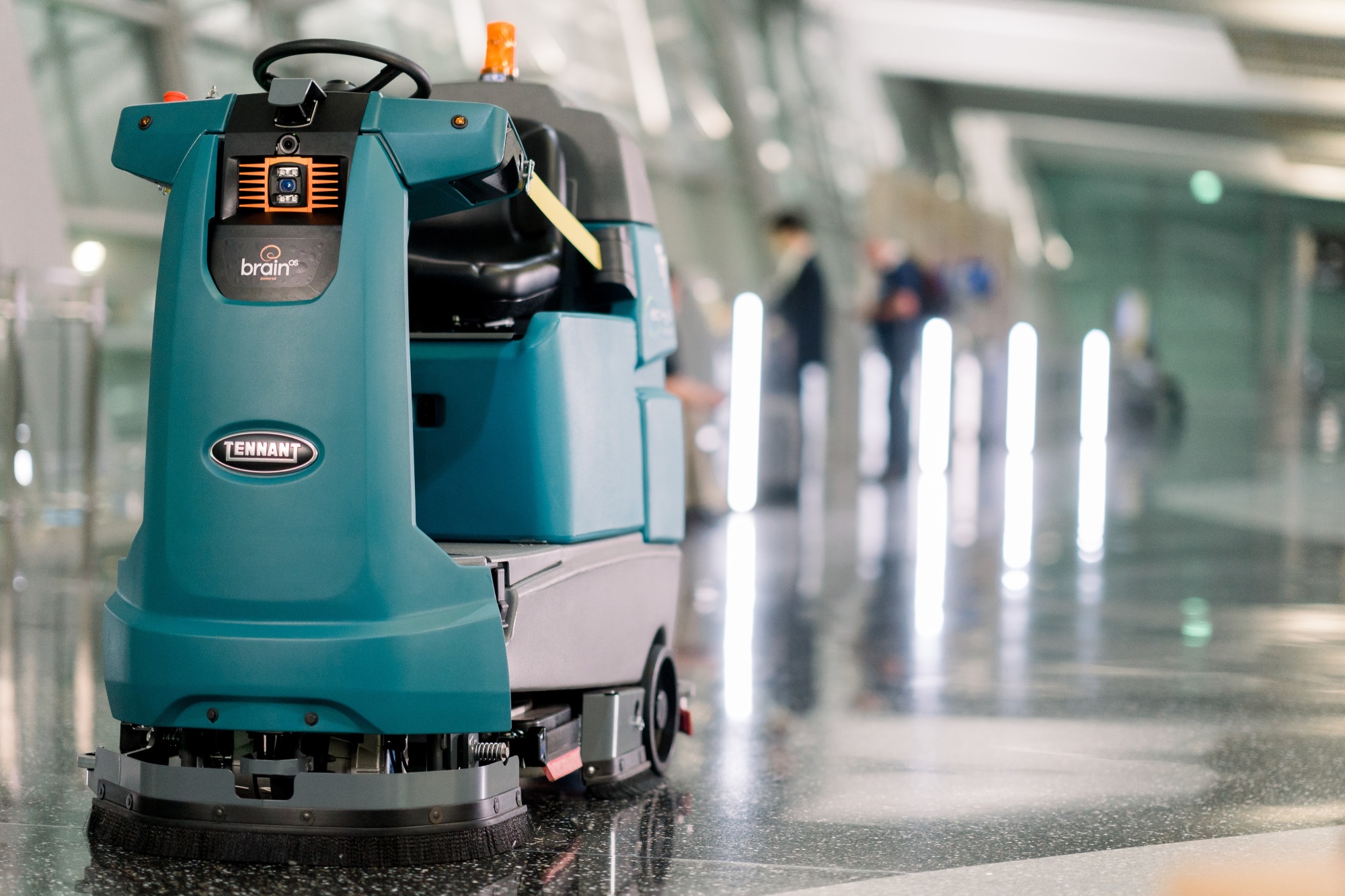OCS to Introduce Cleaning Robots at Morrisons Logistics Sites
OCS and Morrisons have introduced cobotic cleaning machines at retail logistics sites. The Tennant T16 machines clean and dry floors autonomously with a 25-metre...
Read Full Article
Michel Sprujit from Brain Corp Europe discusses the role of robots in the cleaning industry.
Michel Sprujit is the Vice President and General Manager of Brain Corp Europe. Brain Corp is an AI software leader that powers the world’s largest fleet of autonomous mobile robots operating in public spaces. Spruijt joined Brain Corp in 2019 and is responsible for partner support, team expansion, and the oversight of general operations throughout the region. Prior to joining Brain Corp, Spruijt held the position of General Manager EMEA at Ergotron. During his twenty-year tenure, Spruijt successfully built cross-functional teams and managed Ergotron’s growth trajectory in EMEA. He speaks four languages including Dutch, English, German, and Hungarian, and received a degree from Grafisch Lyceum Utrecht.

Picture: a photograph of Michel Sprujit
In the year of a deadly pandemic, cleaning staff have been faced with an unprecedented challenge. COVID-19 has been a serious risk to those charged with maintaining hygiene in facilities and public-facing venues. In their moment of need, cleaners have been increasingly assisted and kept safe by new technology -- in particular, self-driving cleaning robots.
Whenever an unforeseen disaster strikes, and established methods fall short, new, innovative solutions can quickly gain traction and acceptance in an industry. Since the outbreak of the pandemic, one timely solution for the cleaning sector has taken the form of autonomous robots -- specifically, robotic floor scrubbers -- deployed in facilities across Europe.
Habitually, when robots enter a specific sector, fears of job losses are never far behind. Yet in an unprecedented year that dramatically increased the workload for cleaners, these machines have worked seamlessly alongside human teams, taking a share of the strain and providing round-the-clock support.
"Leveraging the power of automation technologies and analytics will become increasingly common in the future of cleaning, especially as variants of COVID-19 linger and the cleaning sector continues to adapt quickly to new challenges. Those who see the value of automation and find a way to deploy robots into operations early will inevitably reap rewards in safety, reputation and ensuring sustainable operations long into the future."
Far from taking the place of in-house cleaning staff, robots have underpinned efforts to keep public spaces clean and safe in the wake of COVID-19.
With cleaning routines now being increasingly tackled by intelligent machines, cleaning staff have more time to focus on higher priority tasks, such as sanitising high-contact surfaces and other sensitive areas. In customer-facing sectors, such as retail, greater automation in cleaning has freed up shop floor staff to handle people-facing responsibilities, such as helping customers and managing new protocols. In manufacturing environments, robotic floor cleaners have allowed employees to manage traffic flow and man production lines more efficiently. As cleaning teams were pushed to their maximum capacity under pandemic conditions, cleaning robots were on hand to lighten an ever-growing workload.
Owing to mechanised consistency, managers have bridged operational gaps at a time when labour shortages and illness have threatened cleaning operations during a critical pandemic scenario. As a result of this, floor scrubbing robots have offset working hours lost to sickness and injury, a problem that blighted the sector before the pandemic.
Brain Corp’s data statistics back up this trend: to date, Brain Corp’s fleet of cleaning robots alone has surpassed a total of 4 million hours of productivity for workers in a variety of public locations.
Environmental hazards are an evergreen problem for the cleaning sector. In a recent study published by The Health and Safety Executive, slips, trips, and falls are still the most common form of non-fatal accidents on the job (29 per cent). These hazards concern floor cleaning staff directly, given their daily exposure to risks working on facility surfaces. Automated solutions mean that human error and exposure to such hazards can be greatly reduced.
The advantages offered to cleaning staff and facilities are not only material, but psychological. The news cycle has repeatedly featured employee fears surrounding cleanliness when returning to work: this has even involved cleaners taking on risky work in the midst of COVID, putting themselves directly in harm’s way in order to ensure hygiene standards are met.
An Accenture report stated that in the aftermath of COVID-19, 64 per cent of respondents were fearful for their health, and 82 per cent fearful for the health of others.
This is further corroborated by Brain Corp’s most recent survey, which found that 72 per cent of retailers expect little reduction in consumer expectations for cleanliness, even as mass vaccination is underway.
Cutting-edge robotics have allowed cleaners to meet these heightened demands. Robotic cleaners collect rich data while cleaning, allowing their performance to be tracked and assessed. This provides quantifiable evidence of their effectiveness and means the proficiency of cleaning operations can be measured closely without relying on guesswork.
Moreover, autonomous cleaning units serve as a visual indicator of heightened safety precautions and general innovation for the public and staff. When a cleaning employee sees an AI-driven floor scrubber, they can be reassured that their place of work is making a concerted effort to keep them safe.
Leveraging the power of automation technologies and analytics will become increasingly common in the future of cleaning, especially as variants of COVID-19 linger and the cleaning sector continues to adapt quickly to new challenges. Those who see the value of automation and find a way to deploy robots into operations early will inevitably reap rewards in safety, reputation and ensuring sustainable operations long into the future.
Picture: a photogrpah of a cleaning robot
Article written by Michel Spruijt | Published 15 July 2021
OCS and Morrisons have introduced cobotic cleaning machines at retail logistics sites. The Tennant T16 machines clean and dry floors autonomously with a 25-metre...
Read Full ArticleThisWeekinFM's latest Spotlight Interview is with Alex Diaz, Founder and CEO of Purgo Supply Services. Alex Diaz’s FM career started at 14 years old when she...
Read Full ArticleMitie has opened a technology demonstration hub at its headquarters at The Shard. The Facilities Transformation Hub is a space where customers can sample some of the...
Read Full ArticleThe Rex Cleaning Cobot, operated by Bidvest Noonan at Swords Pavilions Shopping Centre, has won the Lionsbot International Worldwide Best Performance award...
Read Full ArticleFacilities management services provider NJC has partnered with Dutch engineering company Kite Robotics to deliver window cleaning robots to the UK and Ireland. The...
Read Full ArticleIn post-pandemic recovery, should facilities managers turn to “data-driven leadership” to lead their teams to success? Michel Spruijt, Senior Vice...
Read Full ArticleArtificial intelligence is changing medical practice and the healthcare industry. Technologies including machine learning and digitised data acquisition are allowing...
Read Full ArticleLaunching at The Cleaning Show 2021, Rex the robot uses lidar technology to clean 4,032m² - or the size of a football field - in one hour, the highest cleaning...
Read Full ArticleSelf-driving UV disinfection bots, zero-plastic toilet paper and water-based antimicrobial spray are just some of the innovations to be launched at this year's...
Read Full ArticleIn partnership with the University of Surrey, the British Institute of Cleaning Science and the Cleaning and Support Services Association will embark on a new study on...
Read Full Article